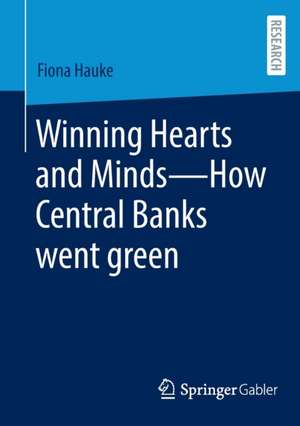Winning Hearts and Minds—How Central Banks went green
Autor Fiona Haukeen Limba Engleză Paperback – 2 ian 2023
Preț: 572.83 lei
Preț vechi: 673.91 lei
-15% Nou
Puncte Express: 859
Preț estimativ în valută:
109.63€ • 114.15$ • 92.65£
109.63€ • 114.15$ • 92.65£
Carte tipărită la comandă
Livrare economică 10-24 martie
Preluare comenzi: 021 569.72.76
Specificații
ISBN-13: 9783658402419
ISBN-10: 3658402415
Pagini: 65
Ilustrații: IX, 65 p. 3 illus. Textbook for German language market.
Dimensiuni: 148 x 210 mm
Greutate: 0.11 kg
Ediția:1st ed. 2023
Editura: Springer Fachmedien Wiesbaden
Colecția Springer Gabler
Locul publicării:Wiesbaden, Germany
ISBN-10: 3658402415
Pagini: 65
Ilustrații: IX, 65 p. 3 illus. Textbook for German language market.
Dimensiuni: 148 x 210 mm
Greutate: 0.11 kg
Ediția:1st ed. 2023
Editura: Springer Fachmedien Wiesbaden
Colecția Springer Gabler
Locul publicării:Wiesbaden, Germany
Cuprins
Introduction.- State of the Art.- Theoretical propositions.- Methodological Approach.- The successful emergence of a policy norm in central banking.- Concluding discussion of the empirical findings.- References.
Notă biografică
Fiona Hauke is currently working as a researcher for the Global Oil & Gas Exit List at the non-governmental organization Urgewald e.V. She studied political science focusing on transformative sustainability studies and political economy at the Universities of Potsdam and Heidelberg.
Textul de pe ultima copertă
In this book, the author traces the emergence of the climate-related financial risks (CRFR) policy norm in central banking. During recent years, Central Banks (CBs) have increasingly started to care about climate change. This development is puzzling and has received surprisingly little scholarly attention so far. Why is it that CBs with a very narrow mandate like the ECB, start to tackle CRFR? What makes CBs adopt a new policy norm on climate change and sustainable development although this provokes discussions about their independence? Based on data collected through expert interviews triangulated with public sources, the author shows that the CRFR policy norm emerged in three steps. First, an epistemic community of think tanks and politically engaged academics framed the idea of CRFR and proposed a policy norm specifically focusing on CBs. Second, the epistemic community taught the CRFR policy norm to early-adopting CBs that acted as norm champions, which helped strengthen its social recognition in the central banking community. Third, the CRFR policy norm has been strengthened by activist campaigns demanding CBs to comply with the emerging new policy norm.
About the author
Fiona Hauke is currently working as a researcher for the Global Oil & Gas Exit List at the non-governmental organization Urgewald e.V. She studied political science focusing on transformative sustainability studies and political economy at the Universities of Potsdam and Heidelberg.
